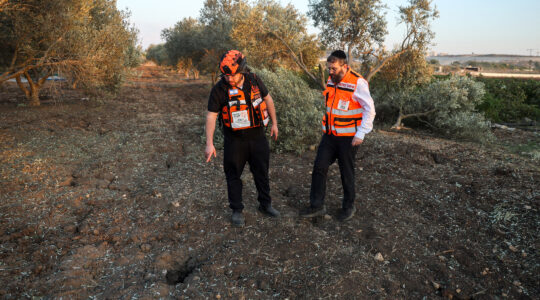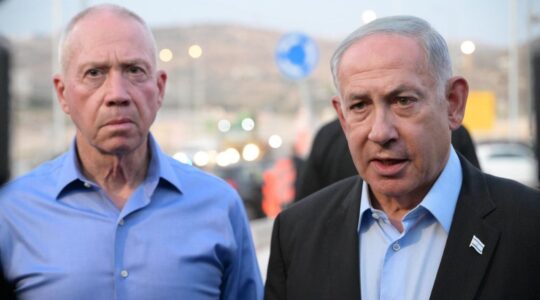JERUSALEM (JTA) – After the pomp and circumstance of Annapolis, Israeli and Palestinian negotiators are gearing up for tough bargaining over the minutiae of a two-state settlement.
Not only will they have to agree on core issues like borders between Israel and a Palestinian state, but they’ll also have to find common ground on a host of lesser concerns regulating relations between the two states, ranging from shared sewage systems to allocations on the electromagnetic spectrum.
The peacemaking, which officially is to begin Dec. 12, will proceed on three tracks: politics, economics and security.
While they negotiate a final deal for a secure Israel alongside a viable Palestinian state, the two sides also will have to meet their obligations under the internationally sponsored road map peace plan.
For Israel, this means freezing construction of Jewish settlements and removing Jewish outposts from the West Bank. For the Palestinians, this means dismantling terrorist militias. The United States will arbitrate on fulfillment.
The Political Track
At Annapolis, the two sides agreed to set up a joint steering committee to monitor and oversee the negotiating process. This committee, headed by the chief negotiator on each side, is scheduled to meet for the first time on Dec. 12. Its first task will be to develop a joint work plan.
Israel will propose setting up as many as 14 working committees, one on each of the six core issues of borders, Jerusalem, refugees, water, security arrangements and Jewish settlements, and the others on secondary issues. Those will include such matters as continued Israeli use of airspace over the West Bank and Gaza, allocation of radio waves on the electromagnetic spectrum – which has important implications for intelligence gathering – joint sewage and waste systems, tax and customs regulations, economic cooperation, border crossing procedures and coordination of the legal systems.
Israel plans to set up a peace administration similar to the one that operated during the Camp David process in 2000. It will have 14 teams of experts for the 14 working committees.
Prime Minister Ehud Olmert will have to decide soon whether the peace administration falls under his jurisdiction or that of Israel’s chief negotiator, Foreign Minister Tzipi Livni. Livni probably will retain her position as chief negotiator, though Olmert could decide on a personnel change.
The Palestinian chief negotiator is former prime minister Ahmed Qureia, who also headed the Palestinian team in the initial phase of the Oslo process.
The Economic Track
The economic track is meant to serve as a catalyst for political progress, with foreign investment giving Palestinians the incentive to create a peaceful state and the capacity to run it.
Thus, a massive influx of international investment should serve both as a carrot for Palestinian peacemaking and as a means to help the Palestinians create functioning institutions and a viable economy.
On Dec. 17, France will host a major donor conference as the economic follow-up piece to Annapolis. In Paris, the Palestinian Authority is expected to ask for a whopping $5.5 billion over three years for budgetary support and development. The money is meant to stimulate the economy, fund new infrastructure constuction and pay for government reforms.
Former British prime minister Tony Blair, the special envoy of the Quartet group of peace sponsors – the United States, the European Union, Russia and the United Nations – is the main mover and shaker.
Blair already has identified four special projects: a Gaza sewage treatment plan, an industrial park sponsored by Turkey, a Japanese funded agro-industrial park, and a plan to revive tourism, especially in Bethlehem. Blair emphasizes the huge job-creating potential of all these labor-intensive projects.
The Security Track
Israel has agreed to allow a shipment of 25 Russian-made armored vehicles, 1,000 rifles and 2 million rounds of ammunition for Palestinian Authority security forces in the West Bank. The idea is to provide short-term support for forces loyal to P.A. President Mahmoud Abbas against Hamas militants active in the Nablus area and, in the longer term, to give Abbas the wherewithal to carry out his principal road map commitment to disarm all terrorist militias.
Already in November, 300 Palestinian special police troops, trained by U.S. Gen. Keith Dayton, started operating in the Nablus area.
Israeli and Palestinian forces also have resumed coordination on the ground, including intelligence exchanges. If the Nablus experiment and the coordination on the ground prove successful, Israel will hand over more West Bank cities to Palestinian Authority forces.
The Road Map
The first of the road map’s three stages requires Israel to dismantle unauthorized West Bank outposts and freeze settlement building, and the Palestinians to prevent terrorist attacks against Israel and dismantle terrorist militias.
Israel’s Defense Ministry hopes to persuade settler leaders to agree to voluntary evacuation of the outposts, possibly in return for commitments on settlements Israel will retain in any final-status agreement.
The United States will monitor implementation of road map commitments, with former NATO commander Lt. Gen. Jim Jones playing the lead role. Jones also will monitor development of the Palestinian security forces and their coordination with the Israel Defense Forces.
Israeli Gestures
In a bid to strengthen Abbas on the Palestinian street, Israel will continue releasing Palestinian prisoners and removing checkpoints.
Together with the planned economic upturn, this is meant to create a feel-good factor on the Palestinian street that will help Abbas move forward toward a peace treaty and win any referendum on a final deal if such a deal is reached.
On Monday, Israel released 429 Palestinian prisoners as part of this confidence-building approach.
Talks with Syria
Another post-Annapolis development could be talks with Syria.
Russia reportedly is planning a follow-up conference in Moscow focusing on the Syrian track, and a high-level Russian emissary reportedly has been shuttling between Jerusalem and Damascus.
However, it is not clear to what extent Israel and the United States are interested in opening a parallel Syrian track at this point. Last week, Olmert said he was not aware of any plans for a conference in Moscow focusing on Israeli-Arab peacemaking.
Prospects
Syria aside, all the trappings of Israeli-Palestinian peacemaking soon will be in place, and while the structuring of the process is impressive, the substance — so far — has been less so.
The big question remains the same as it was before Annapolis — and the same it has been for the last decade and a half: Can Israelis and Palestinians find a way to truly confront and resolve the core differences between them?

Help ensure Jewish news remains accessible to all. Your donation to the Jewish Telegraphic Agency powers the trusted journalism that has connected Jewish communities worldwide for more than 100 years. With your help, JTA can continue to deliver vital news and insights. Donate today.





